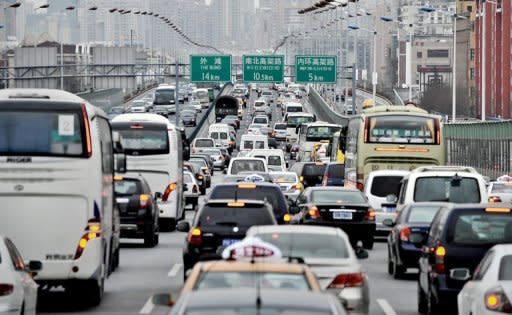US launches air pollution data in Shanghai
The United States consulate in Shanghai has begun issuing its own pollution statistics, giving a much more pessimistic assessment of the city's air quality than official Chinese data. The US consulate began releasing hourly air quality data from a monitoring device in its city centre compound Monday, posting results online and on Twitter, a spokeswoman said Tuesday. Throughout Tuesday morning, the US consulate classified the air quality as "unhealthy", while the Shanghai Environmental Protection Bureau called conditions "good". The discrepancy raised concern among Chinese residents of the city. "I firmly believe that the US data should be trusted," one blogger posted under the name Xiao She 1125. "It's beyond imagination that the air quality could be so bad. What is even more beyond imagination is that our monitoring centre said air quality is good when it looks full of dust." China's air quality is among the worst in the world, international organisations say, citing massive coal consumption and car-choked city streets in the world's biggest auto market. According to the latest Environmental Performance Index compiled by Yale University, China ranked 128th out of 132 countries for air quality. Most Chinese cities currently base their air-quality information on particles of 10 micrometres or larger, known as PM 10, and do not take into account finer particulates that experts say are most harmful to human health. But the Shanghai consulate figures, like those already being issued by the US embassy in Beijing, do monitor the smaller particles known as PM 2.5. Shanghai officials said different measurement standards had caused the discrepancy in the statistics. "The core question is the two sides' air quality standards are different. But there is not much difference in the testing methods, equipment and calculation methods," an official at the Shanghai Environmental Monitoring Centre told the Oriental Morning Post newspaper. "The data from the consulate will be able to indicate the air quality of the limited area around the consulate," Wang Qian, also an official at the centre, told the Shanghai Daily newspaper. Shanghai will begin releasing its own readings including PM 2.5 particulates from next month, state media has reported, after China in February ordered some major cities to begin monitoring for them. The consulate said it had communicated its plans to the Shanghai government in advance and its readings were an "unofficial resource" for the American community in the city. "We have made it clear that this is one monitor that we have in one location in Shanghai and so we don't presume to use that monitor to comment on the city-wide situation," spokeswoman Wylita Bell told AFP.



